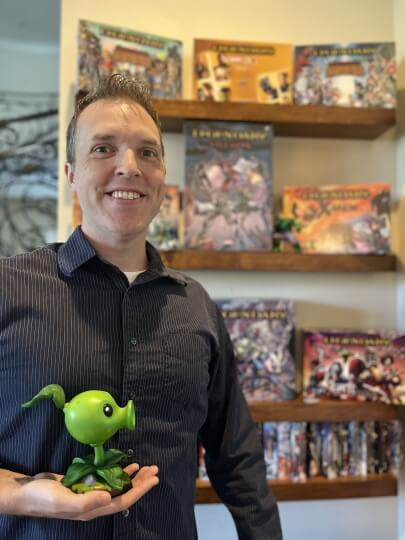Devin Low, A.B./S.M. '02
Of all the board and card games Devin Low played as a kid, one wound up hinting at his future. The game was called “File 13,” a game about game design, that was published in Dragon, a magazine produced by the company behind the iconic role playing game, “Dungeons & Dragons.”
“The joke of the game is that there are 10 million ways a game can get canceled and never come out,” said Low, A.B./S.M. '02. “It wasn’t until much later that I learned you could go into games as a career.”
That’s exactly what Low did. He’s been a board game and video game designer for more than 20 years since studying computer science at the Harvard John A. Paulson School of Engineering and Applied Sciences (SEAS). His career included working for Wizards of the Coast, the company that publishes “Dungeons & Dragons,” and he’s now a game design architect at Riot Games in Los Angeles, which has produced some of the most popular video games in the world.
Low grew up in a games-loving family in Connecticut. Alongside his passion for games, he quickly developed an interest in computer science that stuck with him through his arrival in Cambridge.
“It was like making sorcery with your fingertips,” Low said. “You’d speak these mystical lines into your computer, and things would come out of it. I enjoyed the logical process, the mixture of creativity and reason, that can give birth to something cool.”
Once he got here, Low quickly found a like-minded community in the Harvard-Radcliffe Science Fiction Association. Through that group, he found peers fascinated by “Magic: The Gathering” (MTG), a competitive card game in which players build decks of magic spells and monsters. Wizards of the Coast, the game’s publisher, sponsors an MTG Pro Tour, and Low and his friends became interested in the competition.
“I fell in with a crew that was very serious about Magic and wanted to crack the code on what makes it tick and how to be successful at it,” Low said. “I have a competitive streak, so I agreed to help crack the game.”
It’s no coincidence that Low uses computer terminology like “cracking the code” to describe MTG. It’s a game where each card has special abilities and conditions, and winning often comes down to combining and sequencing how the cards are used to maximize their benefit.
“Some of the same things that appeal about it also apply to computer programming, such as the linear sequences and opportunity to break through and notice something no one has noticed before that could help you be more successful,” he said.
The computer science training from Harvard taught me to think in a structured, logical way.
Within a year of getting his master’s degree, Low joined Wizards of the Coast as head developer for MTG. He broke into the video game industry in 2008 when he became senior designer for Gazillion Entertainment, working on its Marvel Super Hero Squad Online game and its spinoff online card game. He’d go on to work on a mobile game with a six-person startup in Seattle, which in turn led to becoming creative director and lead designer for a mobile game at PopCap Games, which is part of Electronic Arts. Low’s main project at PopCap Games was “Plants vs. Zombies Heroes,” a digital card game he designed and pitched.
“Very often, the momentum for what games to make comes from market factors, executives and researchers,” Low said. “It’s rare that it’s one person saying, ‘Let’s do this.’ But in this case, it was one person saying, ‘Let’s do this,’ and then dozens of other super-talented people helped that come true. I’m really proud of it, I think it’s a great game, and I was grateful I had the opportunity there.”
More than 20 years after leaving SEAS, Devin Low continues to design both physical and video games.
Twenty years in, and Low continues to design both physical and video games. He’s spent more than a decade as lead designer for “Legendary, a Marvel Deck-Building Game,” in which players team up or compete to defeat villains using heroes from the Marvel Universe and has led 35 expansions of that game since its debut.
Low has been at Riot for over two years now, though his specific projects haven’t yet been announced. While he doesn’t do much coding anymore – “the state of the technology has advanced far beyond what I learned” – he spends most of his time pitching new ideas and coordinating between all the different teams involved in game design.
“It’s a lot of work between designers, visual artists, music folks, engineers, quality assurance and producers,” he said. “There’s a lot of interdisciplinary work that’s necessary to be successful, and the closer those pillars can collaborate, the higher quality you’re able to achieve.”
SEAS has a number of affiliated student organizations connected to computer science and gaming, most notably the Harvard College Video Game Development Club. Low’s advice to anyone interested in work in gaming: start programming on your own.
“Getting the first job in the video game industry is the hardest one to get, and the biggest hurdle is demonstrating you have existing skill sets that could provide immediate value,” he said. “Making games independently is a great way to indicate that you’re serious and have the skills to put something together. If you can tell a sincere story about how you’ve made games, got them through the entire process, got them in front of players, learned from them and used that to make the game better, that’s a pretty compelling story.”
Press Contact
Matt Goisman | mgoisman@g.harvard.edu

